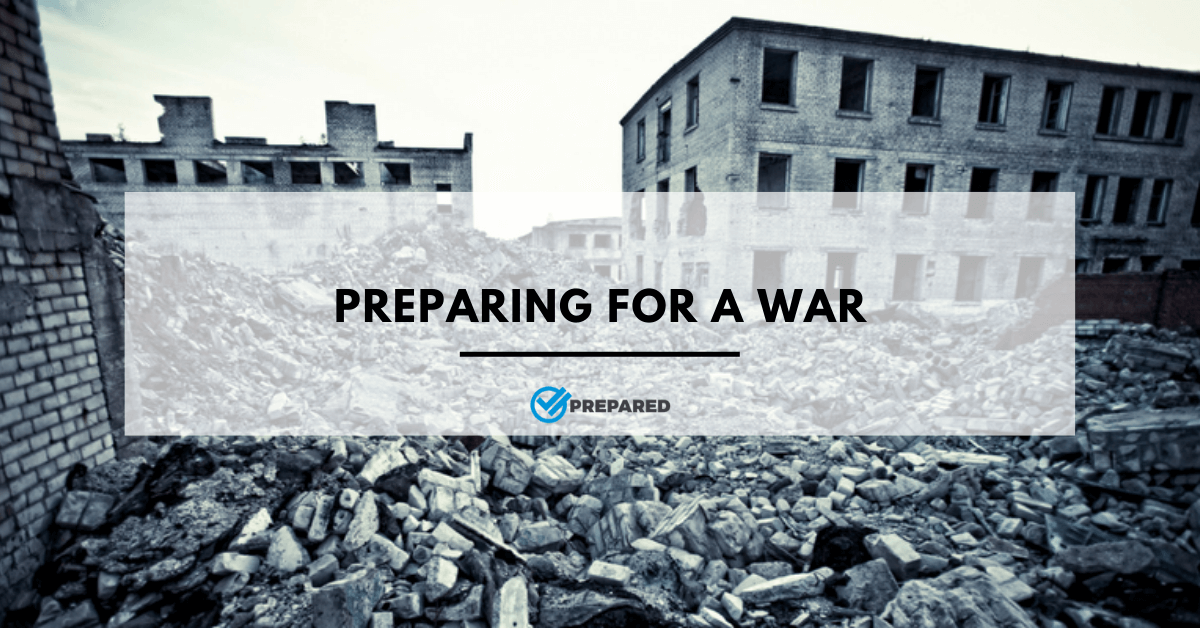The entire idea of a civil war in your country is often so terrifying it becomes unbelievable. However, we see armed conflicts happening around the world; right now. They are often not called civil wars, but make no mistake; what has taken place in Bosnia, Rwanda, Iraq, Syria, and the coup in Turkey, are all armed conflicts.
Civil wars have occurred around the world throughout time. It would probably be harder to find a time in world history when a civil war was not happening. Civil wars do not have to be total war either. Look at the troubles in Ireland in the 20th Century; that was a war, in a modern western nation. It would, therefore, be foolish to pretend it cannot happen.
Why would it happen? To be perfectly honest, unless you are a politician, the why doesn’t really matter, since it is unlikely you will be able to do anything to prevent it. But what can you do? You can start to prepare.
Recognize Increasing Risk of Civil War
The faster you realize that the potential for civil war is increasing, the sooner you can plan to respond to it. This requires a sharp eye and the ability to research and understand the warning signs. Warning signs vary, but can and often include economic crisis, or the rise of radical economic, political, or religious groups.
Experts in civil war at Stanford University found the most common cause of civil war is brutal, oppressive governments in developing countries. This brings on rebellion, and a sympathetic population likely to protect the newly formed rebellion.
Identify The Probable Factions
Recognizing the situation also means knowing the factions and which one you likely fall into. This does not mean that you are a fighter or want a civil war. However, the way these lines are often drawn means that you will fall into one group or another, whether you like it or not. The dividing factors can be race, religion, economic situation, or something as simple as your job. Recognize the sides that are more likely to be hostile towards your side, and identify the sides more likely to be sympathetic to you.
Obviously, you will want to avoid the side that dislikes you, and this might cause you to flee or bug out of your current neighbourhood, town, city, or state into safer territory.
Prioritize Needs Over Wants
If you have to flee your home, you need to prepare appropriately. This means recognizing your needs versus your wants. Needs include food, water, clothing, shelter, and ways to defend yourself, if possible. Wants are expensive electronics, unnecessary amounts of fashionable clothes, and even harder to abandon items like family photo albums.
I always advise building a bug out bag and keeping it on hand at all times. This way, if things happen fast, you are ready to go immediately. This means you will also have a few days’ worth of food and water at the ready. Your needs are always the items that will allow you, and your family to remain safe and healthy as you seek a more secure location.
Another important aspect to consider is the other people in your community who may also need to flee. Working together in a group will often result in diverse skills, equipment, and knowledge. This can increase your likelihood of survival.
Be a Leader (or a good Follower)
If you do decide to form part of a group, you may be a leader or a follower. Both roles are incredibly valuable, and both require a good level of self-awareness. You need to recognize if you are a leader or a follower. If you are a leader, you need to be firm and fair, always setting the example. If you are a follower, recognize that your leader often has a reason for their choices. Do as they say, unless it puts you, or another member in unnecessary danger. Followers, do not be afraid to voice your opinions and the things you know. Leaders, make sure you listen to your followers.
Be Covert
When moving, or just living in a high-risk area, you want to be covert. This is not being a ninja in the dark. It means not drawing attention to yourself. In desperate situations, people get desperate, and vicious opportunists often show their true colours. You do not want to call attention to the fact that you have prepared. The food and water you have saved up will be a valuable target.
You also want to avoid being overly flashy or being too opinionated. In a tense political situation like a civil war, you do not want to be making enemies due to your opinions or lifestyle. You most likely do not want to carry weapons openly. This may create incidents where you are seen as a combatant, and not simply a person trying to survive.
Planning to Relocate
Bugging out may be an absolute necessity. Because of that, you should be prepared to leave your home for safer ground. This is not something you do on the fly and should be pre-planned. How pre-planned? You should be making that plan right now. It is not a good idea to just load up in your family vehicle and hit the road. You need to plan!
Plan where you are going. You need a set destination to where you, your family, and the group will go. Planning to stay at hotels may be a poor idea since all rooms might be filled in the event of an emergency.
Also, plan how you are going to get there. Are you going on foot? By car? By boat? What routes are you going to take to get there? You know where you live, and you know the roads. So plan accordingly.
Plan for when you want to leave. This is largely based on what triggers you have pre-set for a time to evacuate.
Areas to Avoid
Whether or not you plan to bug out in a civil war situation, there are places you generally want to avoid. These areas are most commonly targets for attacks from extremist groups, or areas that are of tactical importance.
- Bridges: Bridges are natural choke points. In war scenarios, holding a bridge can be an invaluable checkpoint for military forces. Military checkpoints may work in your favour, but they will often be areas that are clogged by traffic, so they are slow-moving. You are also likely to be searched and questioned at a checkpoint. Let’s not forget conscripted soldiers are not always the most honest people, and your valuables can become their valuables.
- Airports: During a civil war, most airports are going to go into lockdown mode. An airfield is a significant tactical advantage for military forces. Taking one will be a primary objective for military forces, as is holding one.
- Railroad Tracks: Railroad tracks are another tactical advantage, especially in third world countries. Railroads will often be the most reliable and efficient source of moving supplies from A to B. In many situations, they will be under military control, and most private trains will be taken for military use. Note, this will likely not apply to urban commuter trains. Although you can also expect a higher security presence in these areas.
- Major ports: Ports fall under the same category as airports and railroads. They are used for transporting goods and people and will also be controlled by military forces. They are valuable hubs that will need to be secured.
- Highways: Highways can be dangerous due to a number of reasons. They are popular choke points for ambushes, and crime will likely rise during a civil war. Highways may also be subject to military checkpoints, and in a crisis situation, be packed with people trying to escape.
- Large Events or Gatherings: In civil wars, there will likely be political events for both sides. Rallies, votes and other large, mass attended events can be prime targets, especially if you are dealing with extremists.
Civil War Survival
The thought that your country might be at risk of civil war is a difficult thought to entertain. Read the signs, and be realistic. Your top priority is to survive. You may have to abandon everything you have ever known to do so, but you can survive. Humans are endowed by our Creator with a remarkable ability to survive and press on. So always press on, regardless of the adversity you face, press on.
See these resources for more information on how to plan, organize and lead people during a short or long term survival situation, or how to build a bug out bag.

Chris was born and raised in South Africa and has worked in the field of risk management, organisational resilience, and business continuity for more than a decade. During his career he has seen how private and public sector organisations benefit from effective risk management and business continuity planning. Realising that families and communities can also benefit from the same tools, methodologies, and principles, he started Prepare with Foresight.
Prepare with Foresight was launched to assist individuals and families to have the peace of mind that they will be able to recover from and successfully adapt to the consequences of adverse events.

